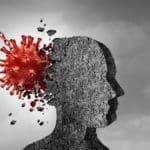Anhedonia is the inability to experience pleasure during usually enjoyable activities. It is a core symptom of Major Depression. Finding treatment for this condition can be difficult. Researchers have found that common antidepressants tend to work less efficiently and effectively for people who have depression with significant anhedonia. Fortunately, transcranial magnetic stimulation (TMS) offers patients a viable and effective anhedonia treatment option.
Anhedonia Types:
There are two types of anhedonia. Social anhedonia occurs when an individual no longer wants to spend time with other people and suffers from a lack of pleasure in social situations. Physical anhedonia is the inability to feel physical pleasures such as eating, touching, or engaging in sexual activity.
What Are the Manifestations of Anhedonia?
Some of the most commonly experienced manifestations of anhedonia include:
- Loss of ability to feel joy
- Social withdrawal
- Negative feelings towards oneself or others
- Inconsolable, and non-respondent when comfort is offered
- Unexplained dread, fear, and irritability
- Reduced emotional abilities, including having less verbal or nonverbal expressions
- Difficulty adjusting to social situations
- A tendency to show fake emotions
- A decrease in interest in sexual activity
What Are the Causes of Anhedonia?
Anhedonia is a main symptom of major depressive disorder (MDD). Anhedonia can also occur as part of other conditions, including schizophrenia, Parkinson’s disease, post traumatic stress disorder (PTSD), diabetes, anorexia nervosa, coronary artery disease, and substance use disorders.
The appearance of anhedonia in patients with varying health concerns has led scientists to think that anhedonia is tied to changes in brain activity and the way in which it produces or responds to dopamine. Recent studies have demonstrated that multiple brain areas are implicated in anhedonia, including the prefrontal cortex, which is the area of the brain directly stimulated by TMS. Specifically, TMS activates the dorsolateral prefrontal cortex (DLPFC), which when it is underactive, causes reduced experience of positive emotions.
Research Surrounding TMS as an Anhedonia Treatment:
About 2/3 of all people who try an antidepressant will not find adequate symptom relief. TMS—a treatment which is a non-invasive and has virtually no side effects—is an effective treatment for those with major depression who do not respond to antidepressants. In addition, TMS is an especially effective treatment for anhedonia.
In a 2019 study, researchers measured changes in anhedonia using the “Happy Faces” task before and after TMS treatment. The study was a sham-controlled, randomized, double-blind study and subjects who received sham stimulation had the option to receive active TMS in the second, open-label phase of the study. In the blinded phase, subjects had 20 sessions of TMS therapy or sham therapy. At the end of the study, based on the 19 participants with complete baseline (time 1) and 20 sessions later (time 2) data, TMS participants showed a meaningful decline in Snaith-Hamilton Pleasure Scale (SHAPS) score and were faster at identifying Happy Faces across time and had increased levels of empathic happiness.
Additionally, a 2020 study entitled Anhedonia in Major Depressive Disorder: Can it be the Chicken AND the Egg for Transcranial Magnetic Stimulation utilized the SHAPS 14-question self-assessment for anhedonia both prior to and after a course of TMS. The study found that with the 116 participants who participated from July 2016 to October 2019, there was significant improvement in hedonic drive from baseline to post-treatment, leading to the conclusion that TMS is a successful intervention method for anhedonic symptoms.
Mid City TMS Provides Treatment for Anhedonia
Transcranial magnetic stimulation, or TMS, is one of the best therapies for anhedonia available. Our process involves sending magnetic pulses to stimulate areas of the brain where low activity can cause depression, including anhedonic symptoms. The procedure is non-convulsive, non-invasive, safe, and FDA approved.
At Mid City TMS, we offer convenient TMS treatments, with sessions lasting 20 to 40 minutes, usually five times per week for six to seven weeks. In addition, our team knows that successful depression treatment often hinges on coordinating multiple therapies, which is why we regularly coordinate care with each patient’s psychiatrist, therapist, or primary care provider.
If you are interested in learning more about TMS, please contact Mid City TMS today, conveniently located in Midtown Manhattan.



